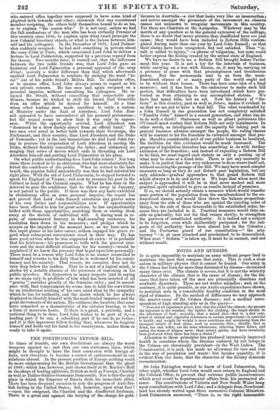THE FORTHCOMING REFORM BILL.
IN times of trouble, our own derelictions are always the worst weapons against us ; and thus our own statesman class, which might be thought to have the least connexion with foreign af- fairs, now threatens to become a source of embarrassment in our relations abroad. In the present position of Europe nothing could be more embarrassing for the British Government than the ghost of 1848; which has, however, just shown itself at St. Martin's Hall in the shape of leading agitators, British as well as Foreign, Chartist as well as Italico-Gallico-Germanic Democratic. Nor is this the only place in which the Emperor of Russia finds his immediate allies. There has been frequent occasion to note the progress of Anti-Bri- tish feeling in the United States; fed, however, upon what fuel P —upon the emigrant, the Chartist and the disaffected Irishman. There is a great riot against the levying of the charge for gold-
lioenees in Australia—a riot that looks very like an insurrection ; and active amongst the promoters of the movement we observe names not unknown to irregular movements in this country. For there are Chartists at the Antipodes. Whatever may be the merits of any question as to the general extension of the suffrage, there is no doubt that many persons thus disaffected have one just cause : they would have been included in Reform Bills contem- plated during more than one year by Lord John Russell ; so that their claims have been recognized, but not satisfied. Thus "in- sult is added to injury,"—a phrase of vulgarism, but none could better express the feeling created by the actual state of England.
We have no desire to see a Reform Bill brought before Parlia- ment this year. It is not a toy for the intervals of business, while carrying on a war with Russia, or, it may be, earrying on a pretence of peace with that presumptuous and treacherous power. But the memoranda sent to us from the num- franchised classes of so many parts of the world ought not to be without their lesson. There has been some idea of a final measure ; and it has been in the endeavour to make each bill perfect, that difficulties have been introduced which have pre- vented us from attaining to any accomplished statute. We have had many bills, but no act. Now the history of " Re- form" in this country, past as well as future, makes it evident to us that we are not to have a final bill. The edict vouchsafed by a John Russell in one generation has not completely satisfied "Finality John" himself in a second generation, and what has he to do with a third P Statesmen as well as pliant politicians like O'Connell must confess that Reform Bills are only instalments. In other words, as intelligence and the capacity for taking part in general business advance amongst the people, the ruling classes will be content to let the franchise be extended amongst that peo- ple. Should a considerable part of our public business be localized, the facilities for this extension would be much increased. The progress of legislation therefore has something to do with farther extension of the franchise ; and instead of expecting a Reform Bill to be final, we must regard each statute as only a posting up of what may be done at a fixed date. There is not any necessity to make it so perfect that the very endeavour to do so wears itself out, without securingthe passage of the Bill. We may have much simpler measures so long as they do not disturb past legislation, but are only addenda—gradual approaches to that grand Reform Bill which always is to be and never is. We hope that when next the subject is approached it will be in that more modest and more practical spirit calculated to give us results instead of promises. If so, we should actually obtain a measure which would transfer some portion of the population from the unenfranchised to the en- franchised classes, and would thus throw the balance proportion- ately from the side of those who are against the existing order of things, to the side of those favourable to the established order, be- cause they are included in it. Practical measures would thus en- able us gradually, but not for that reason slowly, to strengthen the garrison of constituted authority. It is indeed not a subject to be forgotten, even while deliberately postponed ; for the out- posts of old authority have been almost lost in the Colonies ; and the Praetorian guard of our constitution—" the aris- tocracy "—is at once attacked and proclaimed to be demoralized. When next " Reform " is taken up, it must be in earnest, and not without result.


























 Previous page
Previous page